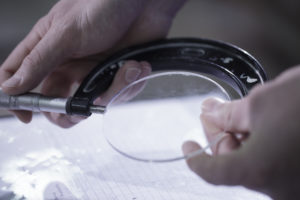For engineers who work with glass parts or components, there are many important properties of glass to understand. In previous posts, we have covered several different properties of glass, including transmittance, transmission, and refractive index.
- Transmission and transmittance are both ways of measuring the amount of light that can pass through a material without being absorbed.
- Refractive index is a measurement of the velocity at which light travels through a material.
Absorption is another key property of glass. In this post, we will go over what absorption is, and what factors change the absorbance of glass. With this information, you will be able to make an informed decision about the right glass for your application.
What Is the Absorption Spectrum of Glass?
 Light is made up of photons. When a photon hits a material, it can emit energy that matches the amount required to excite an electron into a higher energy state. This will cause the photon to be absorbed by the material and not pass through it.
Light is made up of photons. When a photon hits a material, it can emit energy that matches the amount required to excite an electron into a higher energy state. This will cause the photon to be absorbed by the material and not pass through it.
When talking about glass specifically, we typically want as few photons as possible to be absorbed. As photons are absorbed, the intensity of the light on the other side of the glass is reduced. The absorbance factor of glass measures how much the intensity of the light decreases when it passes through the glass.
A material with high absorption, such as a neutral density filter for a camera, can dramatically decrease the intensity of the light passing through. This can be very useful in some situations, and very unwanted in others. If your application calls for as much light as possible to be let through, you will want a glass that features low absorption. If your application is being used to block light or reduce its intensity, you will want to select properties of glass to increase absorption.
What Factors Change the Absorbance of Glass?
There are three main factors that impact absorbance:
Thickness
Thickness is the easiest factor to understand and control. The more time it takes light to travel through glass, the more likely it is that a photon will excite an electron and be absorbed. By reducing the thickness of the material, you increase the amount of light that can pass through.
Composition
Glass reacts to light differently based on its chemical composition. Completely clear glass, for example, absorbs between 2-4% of the light that passes through it, while prismatic glass absorbs between 5-10%. Different formulations of glass have different properties, and a glass chosen for its strength or impact resistance may not have the best optical clarity.
Wavelength
Certain wavelengths of light react with specific materials and increase their absorption. For example, take a green piece of glass. If a red light shines on green piece, it’s likely that almost no light would pass through. Shining a white light would cause a moderate amount of light to pass through. If you shine a green light onto the green glass, however, almost all of the light would pass through the material. When looking to block a certain wavelength of light—as in many darkroom applications, for instance—you would choose glass that has a high absorption of that specific wavelength.
Swift Glass’s Capabilities
Swift Glass caters to customers across many different industries with a wide variety of different application needs. We offer a wide range of services, such as:
- CNC glass machining
- Waterjet and glass cutting
- Thermal glass tempering
- Polishing
- Grinding
- Chemical glass strengthening
- Surface polishing
- Lapping
- Glass drilling
- Glass wafer fabrication
We ensure optimal quality for all of our customers, so we have a wide variety of inspection tools at our disposal. We use a coordinate measuring machine, polarimeter, optical comparator, and high powered microscopes to check the optical properties of all of our products.
If you need more information about the properties of glass, or are ready talk to us about your application, request a quote today.




